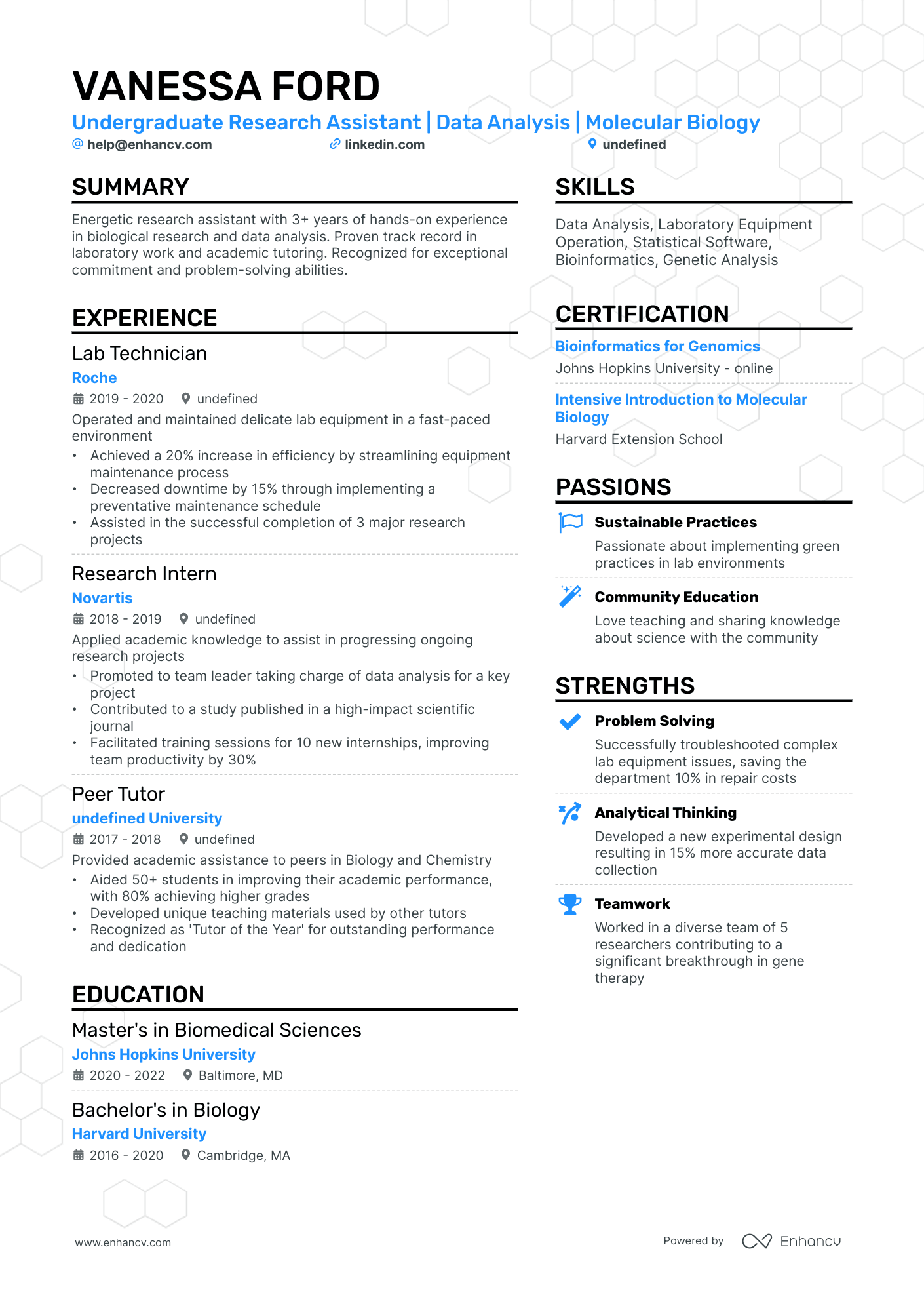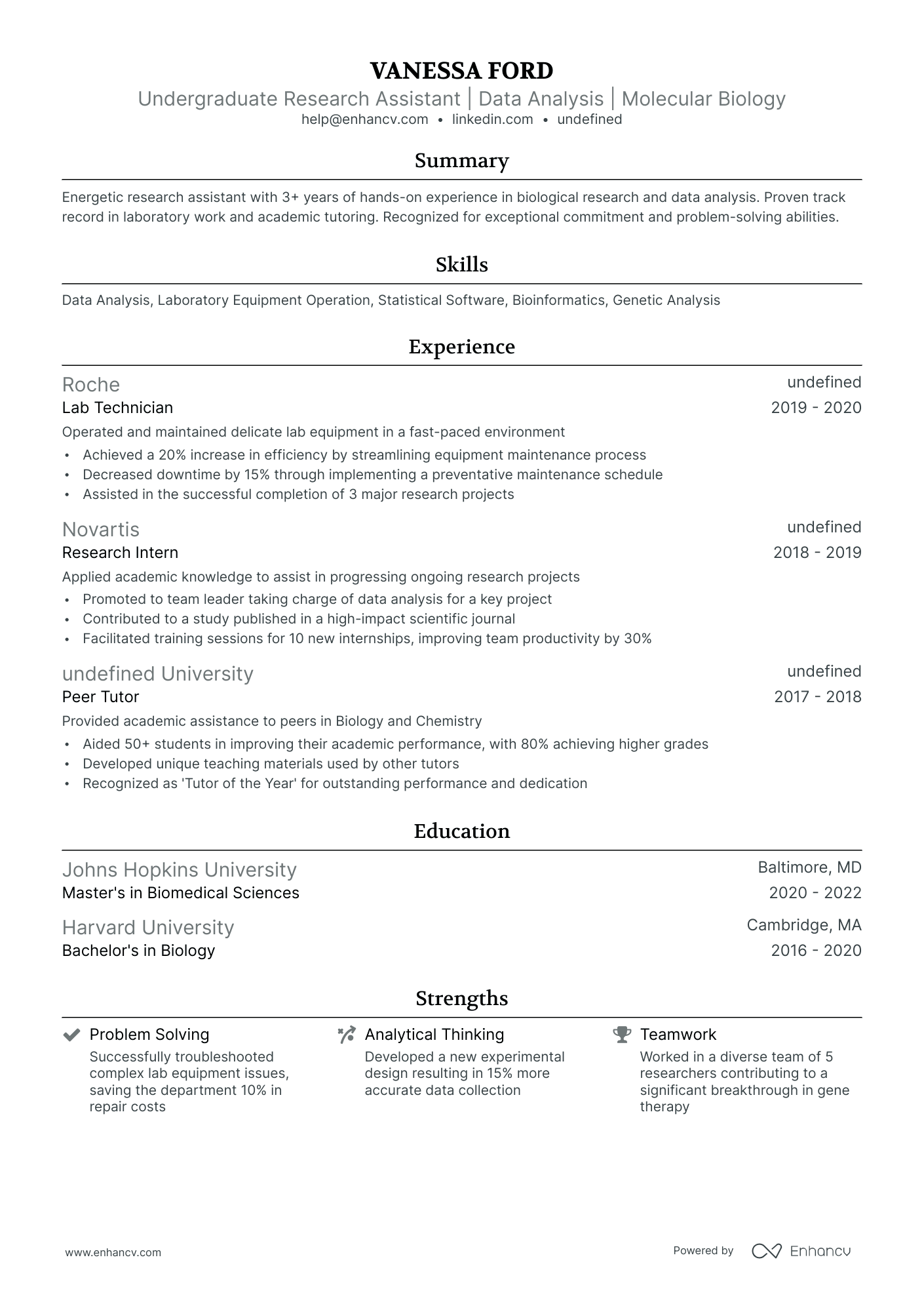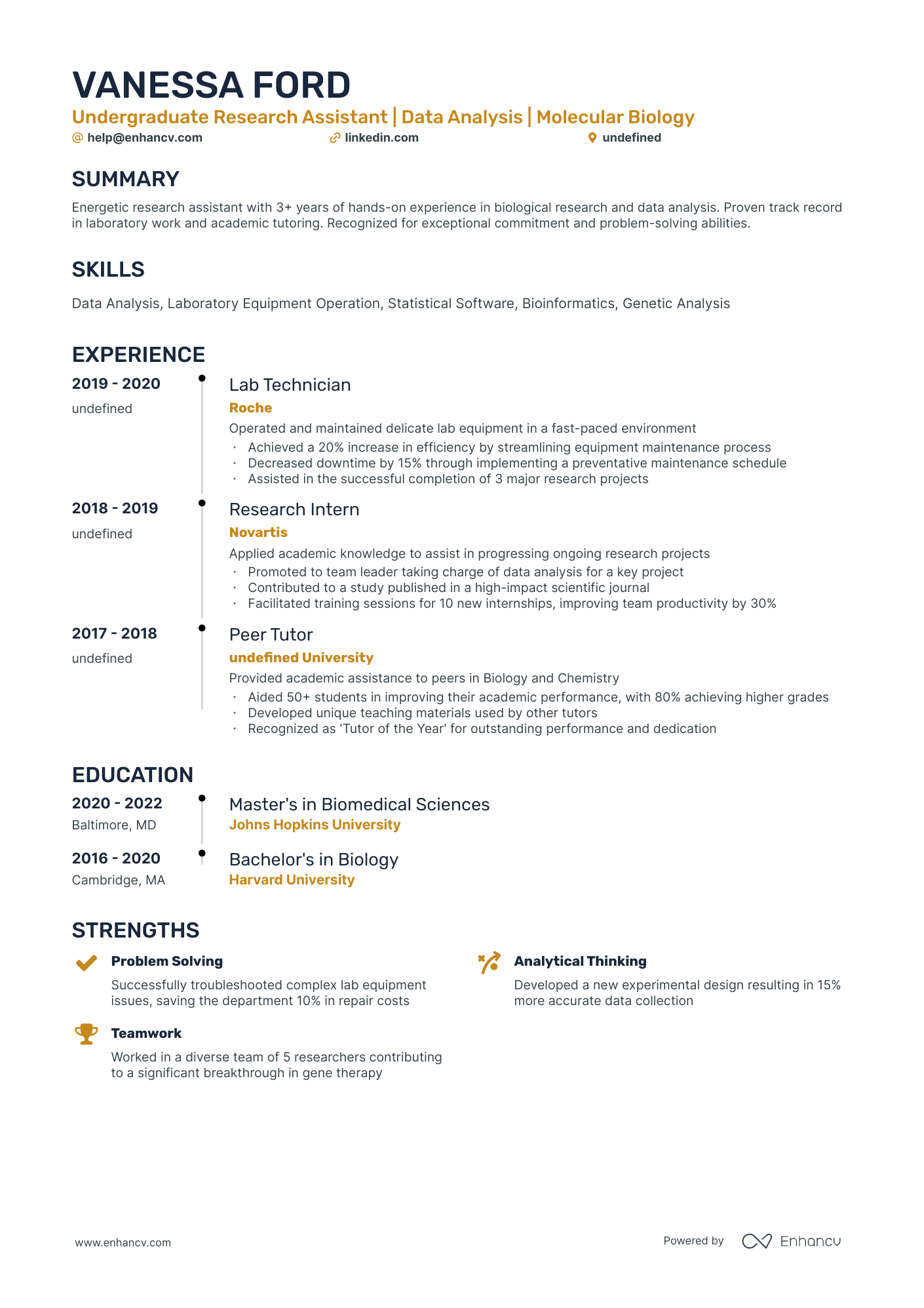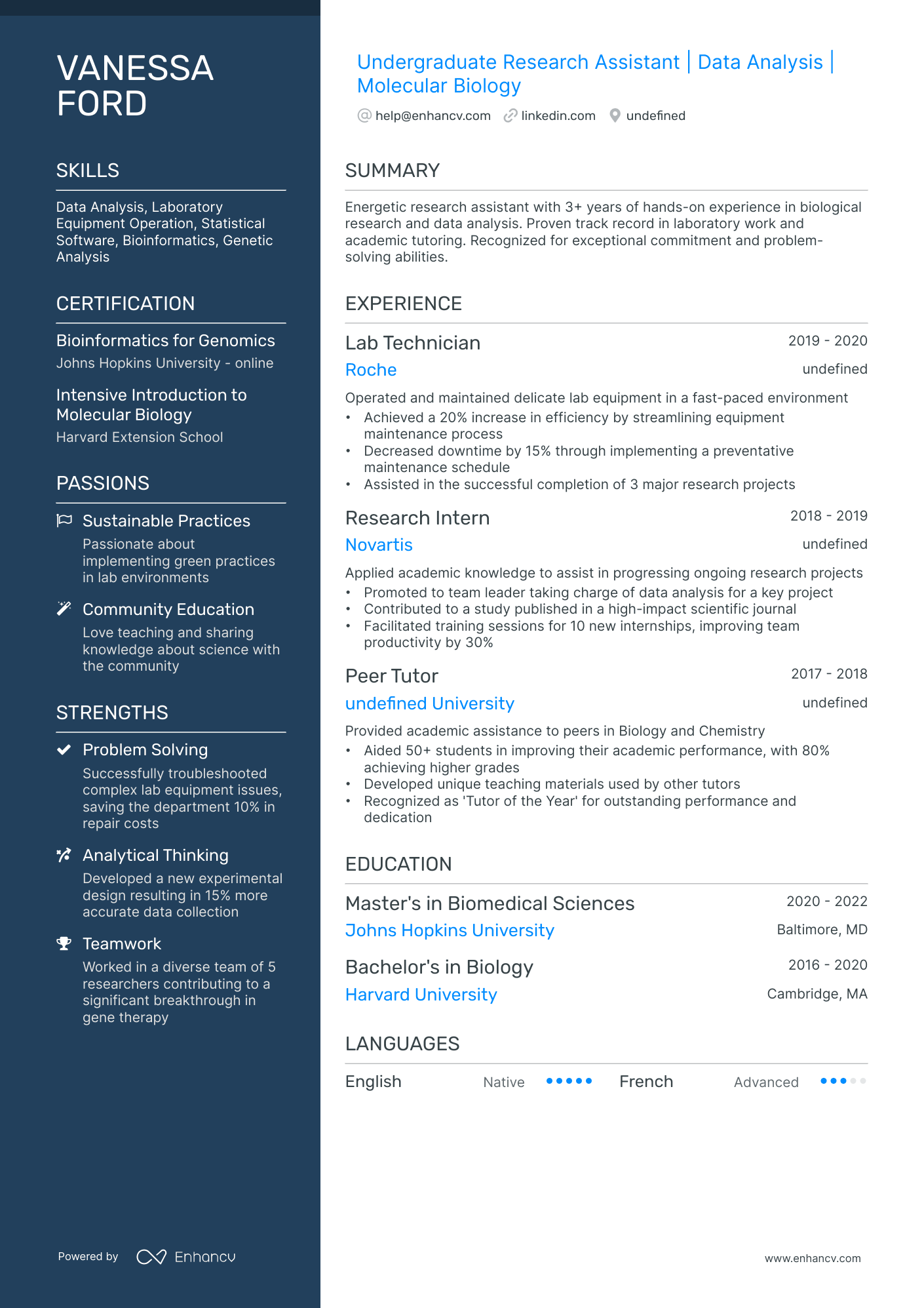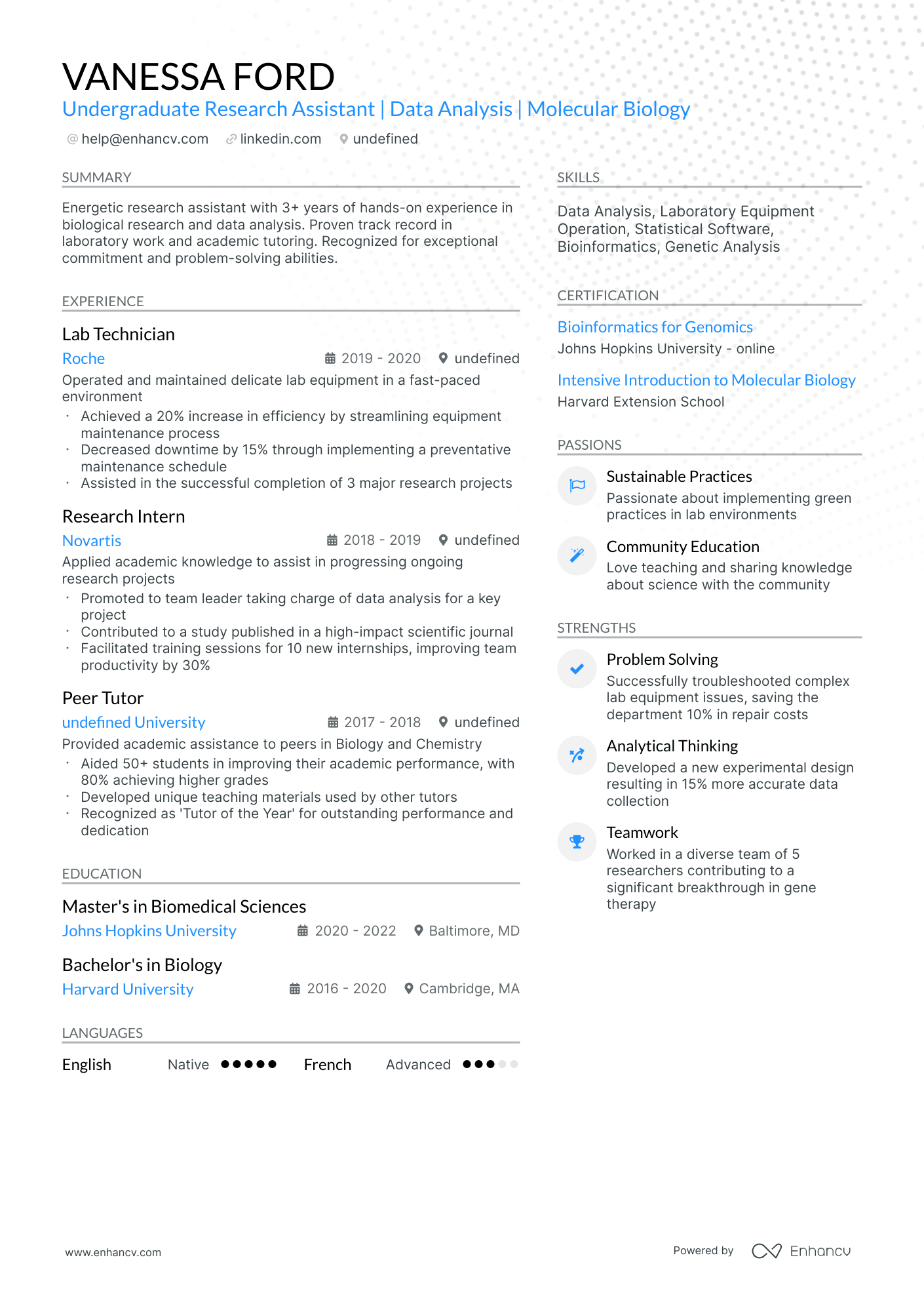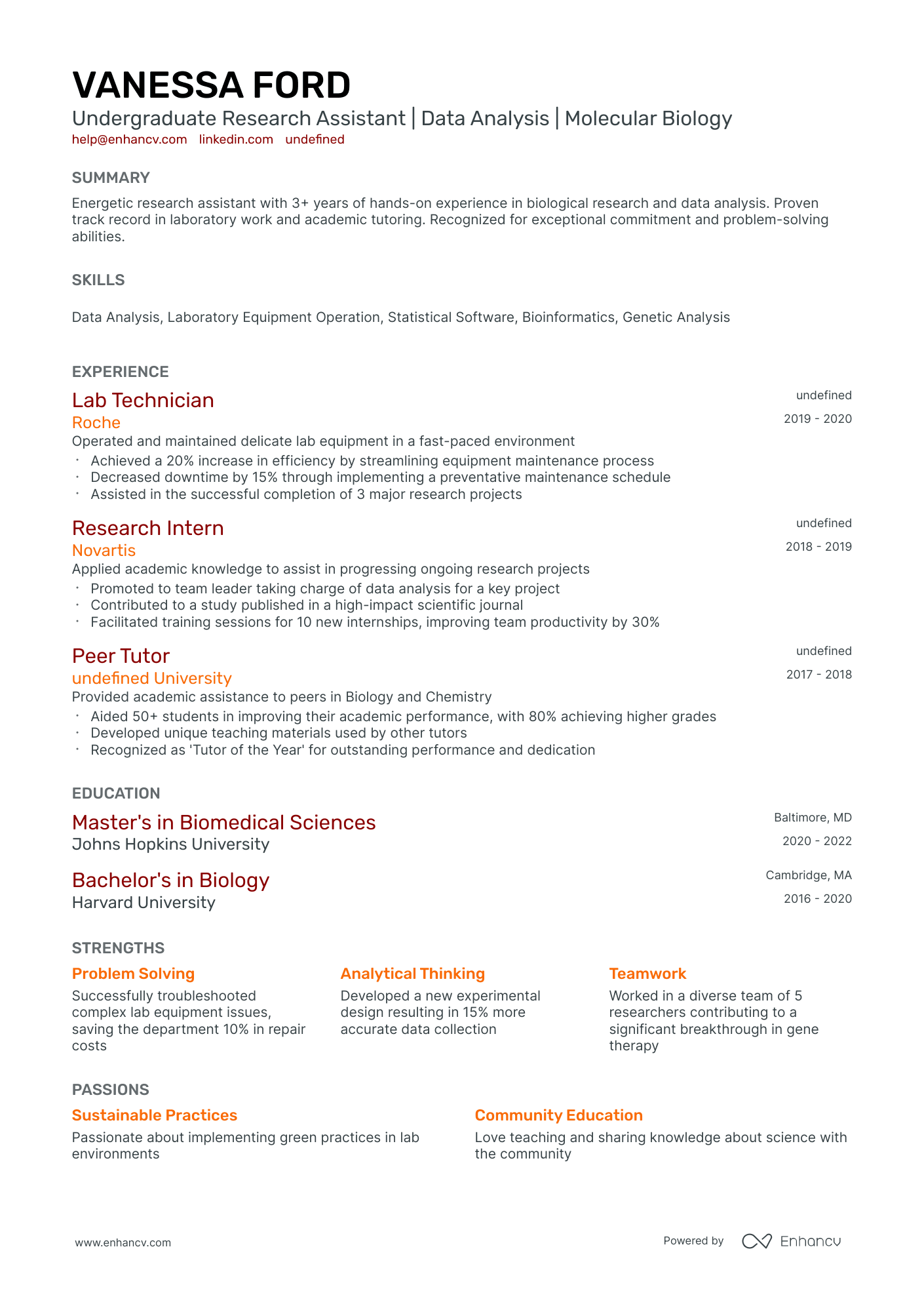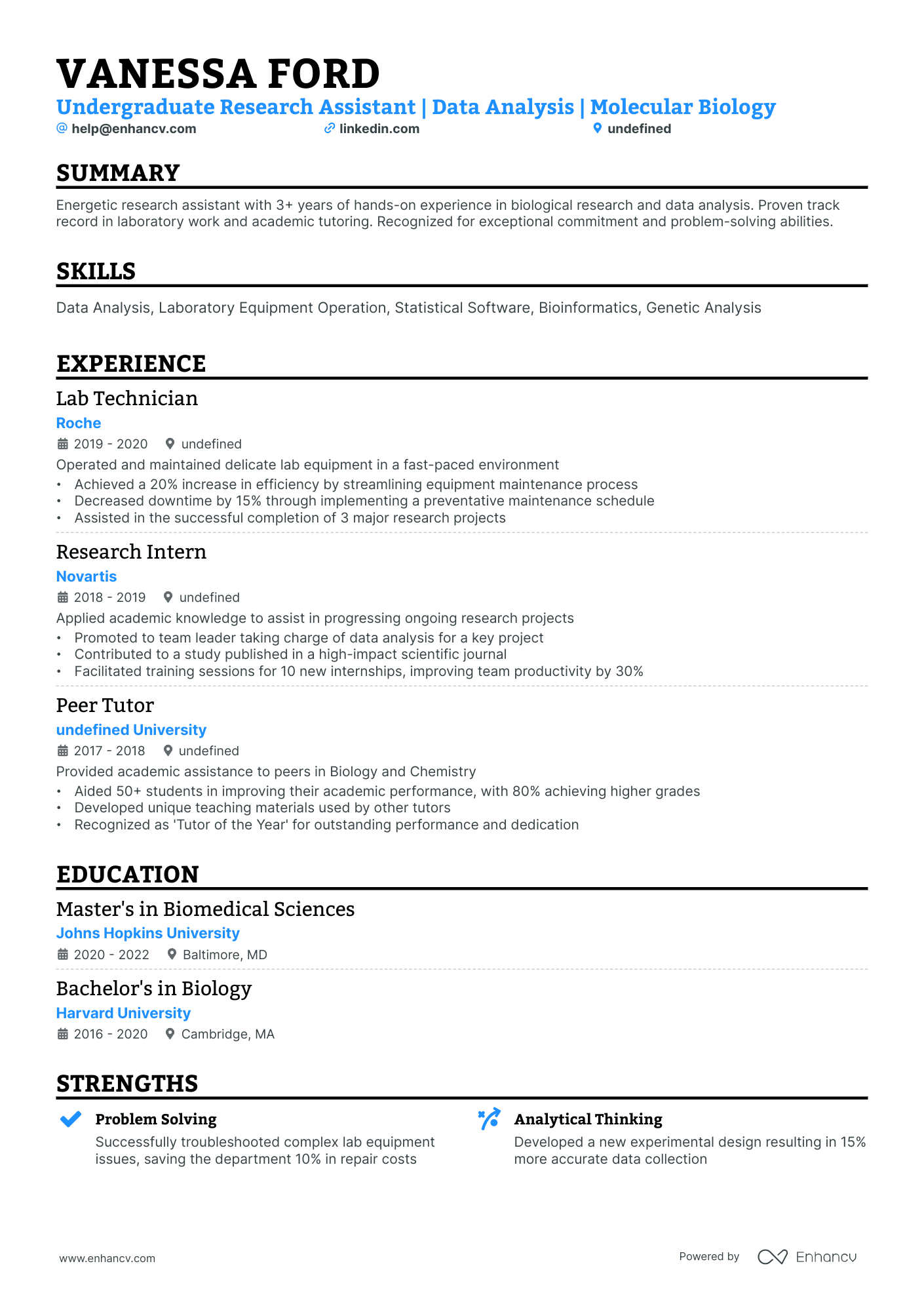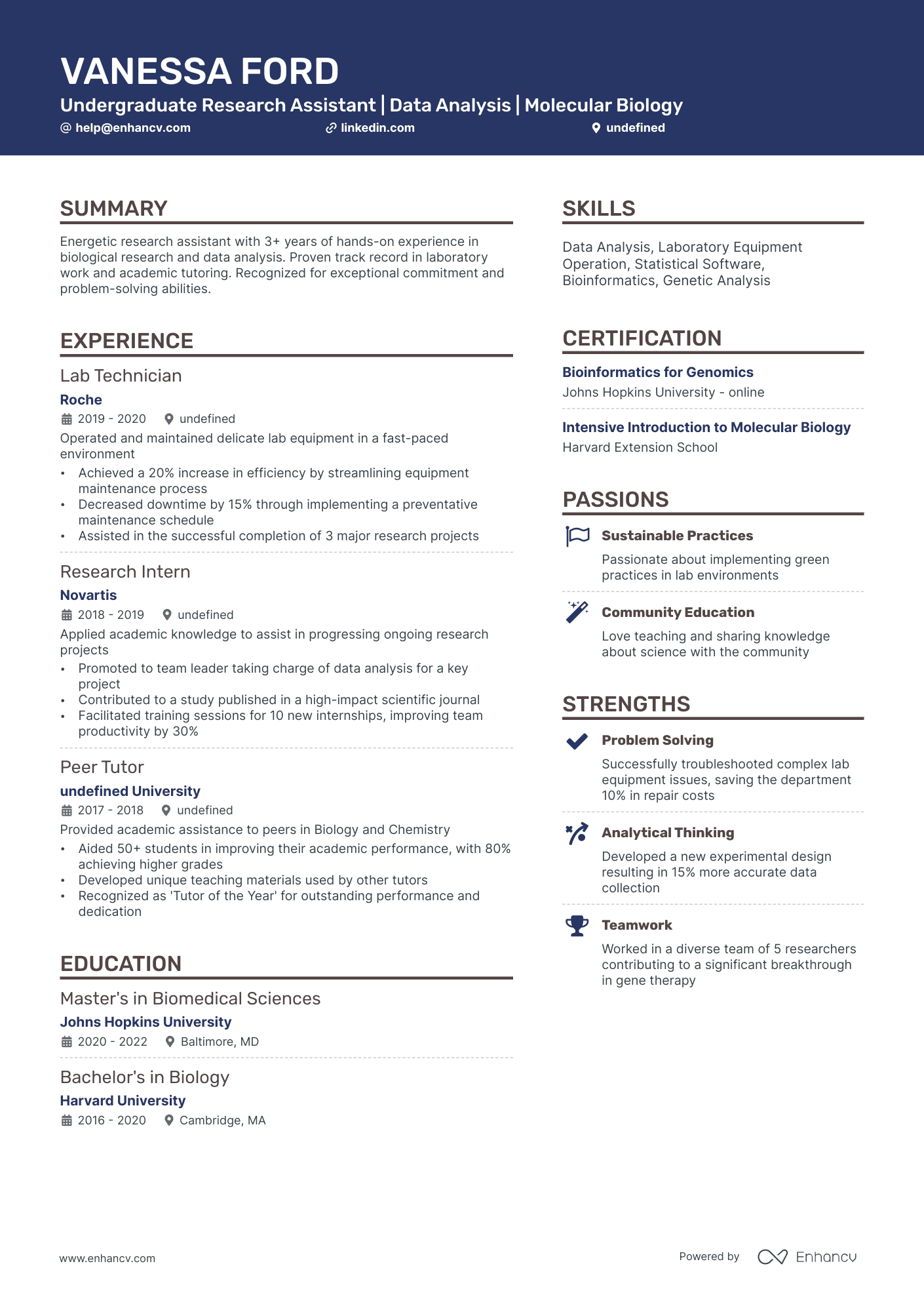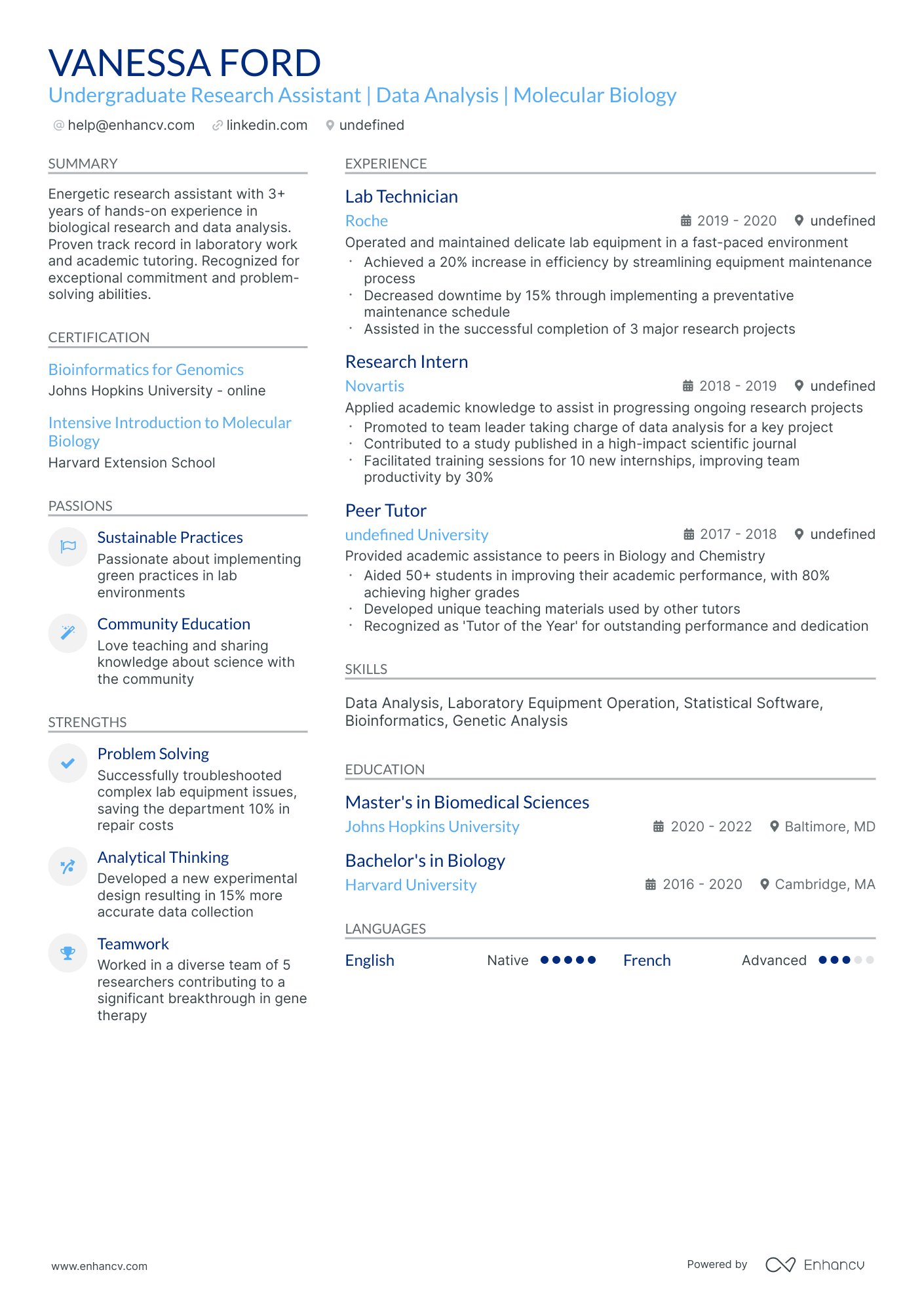Undergraduate research assistants often struggle with effectively articulating the relevance and impact of their research experiences on their resumes. Our guide can provide practical tips and examples on how to translate these complex research projects into understandable and compelling bullet points that resonate with potential employers.
Dive into this guide to uncover:
- Top-tier undergraduate research assistant resume samples that have successfully landed candidates in leading companies.
- Strategies to direct recruiters' focus towards your standout experiences, notable achievements, and pivotal skills.
- Guidance on crafting resume sections that align closely with the vast majority of job specifications.
- Insights on harmonizing your undergraduate research assistant technical prowess with your distinct personality, setting you apart from the competition.
Recommended reads:
crafting a stellar undergraduate research assistant resume format
Navigating the maze of resume formatting can be challenging. But understanding what recruiters prioritize can make the process smoother.
Wondering about the optimal format, the importance of certain sections, or how to detail your experience? Here's a blueprint for a polished resume:
- Adopt the reverse-chronological resume format. By spotlighting your latest roles upfront, you offer recruiters a snapshot of your career trajectory and recent accomplishments.
- Your header isn't just a formality. Beyond basic contact information, consider adding a link to your portfolio and a headline that encapsulates a significant achievement or your current role.
- Distill your content to the most pertinent details, ideally fitting within a two-page limit. Every line should reinforce your candidacy for the undergraduate research assistant role.
- To preserve your resume's layout across different devices and platforms, save it as a PDF.
Remember, resume layouts can vary by country – for example, a Canadian resume format could look different.
Upload your resume
Drop your resume here or choose a file. PDF & DOCX only. Max 2MB file size.
Pro tip
Make sure your resume is ATS compliant and catches the recruiters' attention by tailoring your experience to the specific job requirements. Quantify and highlight why you're the best candidate for the role on the first page of your resume.
Essential sections for your ux researcher resume, favored by recruiters:
- A clear header with pertinent links and contact information.
- A concise summary or objective, offering a snapshot of your career milestones and your fit for the ux researcher role.
- An experience section detailing your professional qualifications and achievements.
- Skills sections that align your talents with job-specific keywords and requirements.
- Education and certifications sections that underscore your dedication to industry-specific growth.
What recruiters want to see on your resume:
- Relevant course work: Details on coursework relevant to the field of research can demonstrate both knowledge and interest.
- Experience in research: Any prior experience, especially hands-on experience in a lab or other research setting is highly valuable, even if it was only for a class project or was unpaid.
- Technical skills: Knowledge of specific techniques, tools, and software relevant to the field of research can set an applicant apart.
- Demonstrated ability to analyze complex data: This could be through past research projects, class assignments, or other experiences.
- Good communication skills: Research often requires working as part of a team, so evidence of strong written and oral communication skills are important.
Recommended reads:
How to create the cornerstone experience section of your undergraduate research assistant resume
A meticulously crafted undergraduate research assistant resume experience section is a recruiter's delight. This segment not only responds to job criteria but also throws light on your technical expertise and character.
To craft an impactful experience section:
- Highlight roles directly related to the position in question.
- Pair each role or task with a metric that quantifies your achievements.
- Chronicle your undergraduate research assistant career progression, illustrating your dedication and growth in the domain.
- For each role, elucidate challenges faced, strategies employed, and the broader organizational impact.
Examine the following undergraduate research assistant samples to discern how seasoned professionals have articulated their experiences:
- Conducted research on protein interactions in cancer cells, resulting in a published paper in a peer-reviewed journal.
- Collaborated with a team of researchers to design and execute experiments, analyze data, and present findings at conferences.
- Developed and maintained a database to organize and manage research data, improving efficiency by 20%.
- Assisted in the development of new laboratory protocols for cell culture techniques and molecular biology experiments.
- Contributed to grant proposals by researching relevant literature, writing sections, and preparing budget justifications.
- Performed literature reviews and gathered data on climate change impacts for an environmental research project.
- Assisted in fieldwork activities, collecting samples and recording observations in diverse ecosystems.
- Analyzed data using statistical software and generated visualizations to identify trends and patterns.
- Collaborated with senior researchers to prepare reports and presentations on research findings.
- Contributed to a team working on an interdisciplinary project, involving scientists from various fields.
- Assisted in the development and testing of software algorithms for image processing applications.
- Implemented code optimizations, resulting in a 30% reduction in processing time for large datasets.
- Conducted experiments to evaluate algorithm performance and validate results against ground truth data.
- Collaborated with researchers in designing and executing experiments to assess algorithm accuracy.
- Published research findings in a computer science conference proceedings.
- Conducted research on renewable energy technologies, focusing on solar cell efficiency improvements.
- Designed and performed experiments to optimize fabrication processes resulting in a 15% increase in solar cell efficiency.
- Analyzed data using mathematical models and statistical techniques to identify factors influencing performance.
- Collaborated with industry partners to develop prototypes and test new materials for solar cell applications.
- Prepared technical reports and presentations summarizing research findings for internal and external stakeholders.
- Assisted in conducting clinical trials for pharmaceutical drug development, ensuring compliance with protocols and regulations.
- Collected and analyzed patient data, maintaining accurate and confidential records throughout the study.
- Coordinated activities between research sites, sponsors, and ethics committees to facilitate trial progress.
- Contributed to the preparation of regulatory submissions and documentation for FDA approval.
- Participated in team meetings and provided updates on trial progress and data analysis.
- Assisted in the design and implementation of user experience (UX) research studies for software product development.
- Conducted usability tests, interviews, and surveys to gather user feedback resulting in identified pain points and improvement recommendations.
- Analyzed qualitative and quantitative data to generate insights and actionable recommendations for design teams.
- Contributed to the creation of user personas and journey maps to inform product development decisions.
- Collaborated with cross-functional teams to incorporate user-centered design principles into products.
- Assisted in conducting market research to identify growth opportunities and competitive landscape in the industry.
- Analyzed industry trends and customer preferences to provide recommendations for product positioning and marketing strategies.
- Developed surveys and conducted interviews to gather customer feedback on new product concepts.
- Collaborated with the marketing team to create promotional materials and support marketing campaigns.
- Assisted in analyzing sales data and preparing reports to evaluate the effectiveness of marketing initiatives.
- Assisted in conducting geological surveys and mapping to assess potential sites for mineral exploration.
- Collected rock and soil samples, performed laboratory tests, and analyzed data to identify mineral deposits.
- Collaborated with geologists in fieldwork activities, documenting findings and observations.
- Contributed to the preparation of technical reports and presentations summarizing exploration results.
- Used Geographic Information System (GIS) software to assist in spatial analysis and map generation.
- Assisting in a research project focused on developing machine learning models for predictive analytics.
- Collecting, cleaning, and preprocessing large datasets to train and evaluate machine learning algorithms.
- Conducting experiments to compare the performance of different models and feature engineering techniques.
- Collaborating with researchers to interpret and analyze model outputs to gain insights and improve accuracy.
- Preparing research papers and presentations to communicate findings to the scientific community.
- Contributed to a research project investigating the impact of social media on mental health outcomes.
- Designed and administered surveys to collect data from study participants, ensuring ethical considerations were met.
- Analyzed survey responses using statistical software and conducted qualitative content analysis on open-ended questions.
- Collaborated with senior researchers to interpret findings and contribute to research publications.
- Presented research results at academic conferences and participated in panel discussions on the topic.
Quantifying impact on your resume
<ul>
Building a undergraduate research assistant resume when experience is sparse
If you're light on relevant experience, consider highlighting:
- Short-term roles or internships undertaken during your academic years.
- Contractual roles, emphasizing their relevance and the outcomes achieved.
- Alternative resume formats, such as functional or hybrid, that spotlight your skills.
- Research roles, especially if they involved significant projects or if your contribution was pivotal to the project's success.
Recommended reads:
Pro tip
The experience section is all about relevancy to the undergraduate research assistant role. Decide on items that will show your expertise and skills in the best possible light.
Essential undergraduate research assistant hard and soft skills for your resume
Recruiters evaluate not just your professional history, but also how your skills resonate with the job's requirements.
Your skills are categorized into:
- Hard or technical skills: These reflect your proficiency in specific tasks or technologies.
- Soft skills: These pertain to your interpersonal abilities and how you adapt to various situations.
When crafting your resume, ensure you:
- Highlight five to six skills that directly align with the job description.
- Integrate industry-specific keywords while also emphasizing your unique strengths.
- Support your skills with an achievements section, detailing tangible outcomes.
- Quantify your proficiency wherever possible, rather than merely listing skills.
To help you, we've curated a list of the most sought-after hard and soft skills for undergraduate research assistant roles.
Top skills for your undergraduate research assistant resume:
Statistical Analysis Software (e.g., SPSS, R, Python)
Data Collection and Management
Laboratory Techniques (e.g., pipetting, chromatography)
Literature Review and Research Methodologies
Data Visualization Tools (e.g., Tableau, Matplotlib)
Survey Design and Analysis
Field Research Techniques
Programming Languages (e.g., Python, MATLAB)
Database Management Systems (e.g., SQL)
Microsoft Office Suite (e.g., Excel, Word)
Communication Skills
Team Collaboration
Critical Thinking
Time Management
Problem-Solving
Attention to Detail
Adaptability
Organizational Skills
Initiative
Ethical Judgment
Pro tip
When detailing your skills, always back them up with tangible evidence, be it quantifiable results or certifications.
Undergraduate research assistant resume: certifications and education
Boost your undergraduate research assistant resume by:
- Featuring recent and relevant certificates.
- Listing basic details: certificate name, school, and dates.
- If you lack experience, highlight skills from your education.
- Only include valid license numbers if needed.
Job ads often list desired education and certificates. Match these with top industry certificates.
Best certifications to list on your resume
Pro tip
Listing your relevant degrees or certificates on your undergraduate research assistant resume is a win-win situation. Not only does it hint at your technical capabilities in the industry, but also at a range of soft skills, including perseverance, adaptability, and motivation.
Recommended reads:
Crafting the undergraduate research assistant resume summary or objective: a blend of achievements, aspirations, and uniqueness
Whether you opt for a resume summary or objective depends on your career trajectory.
- If you have a rich tapestry of relevant achievements, a resume summary can spotlight these accomplishments.
- If you're relatively new or transitioning, a resume objective can articulate your aspirations and how they align with the role.
Regardless of your choice, this section should encapsulate your unique value proposition, blending your technical and interpersonal strengths.
Resume summary and objective examples for a undergraduate research assistant resume
Four additional sections to consider for your undergraduate research assistant resume
To give a fuller picture of who you are, consider adding these sections to your undergraduate research assistant resume:
- Awards - to showcase your achievements.
- Interests - to share passions outside of work.
- Publications - to highlight your contributions to the field.
- Projects - to spotlight significant accomplishments, even those outside of traditional work settings.
Key takeaways
- Your resume should be a curated narrative, highlighting your alignment with the role's requirements.
- Strategically position your skills, balancing both technical and interpersonal strengths.
- Be selective in detailing experiences, focusing on relevance and impact.
- Utilize the summary or objective to offer a snapshot of your professional essence.
- Across all sections, prioritize authenticity and clarity, ensuring your resume resonates with the undergraduate research assistant role you're eyeing.
